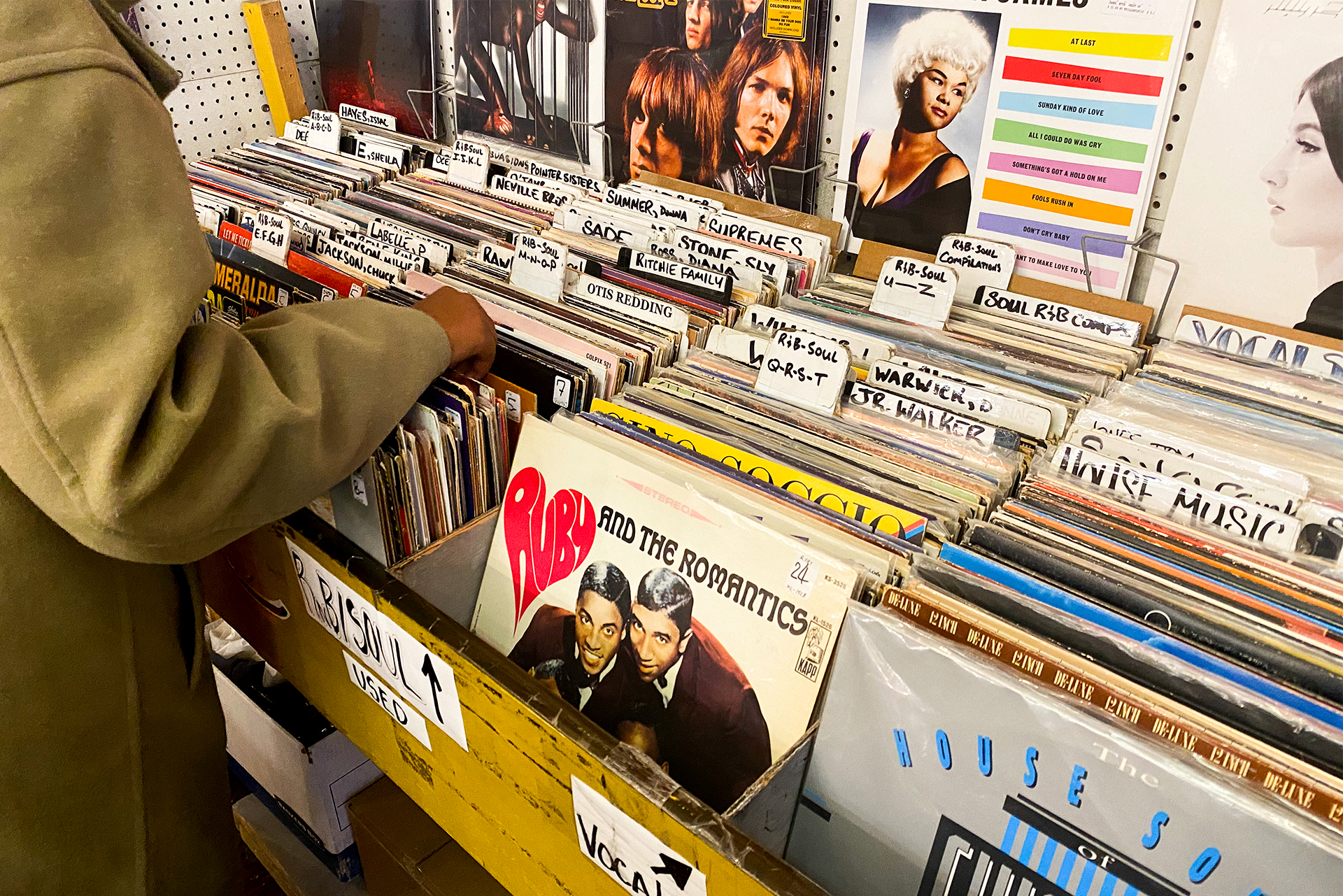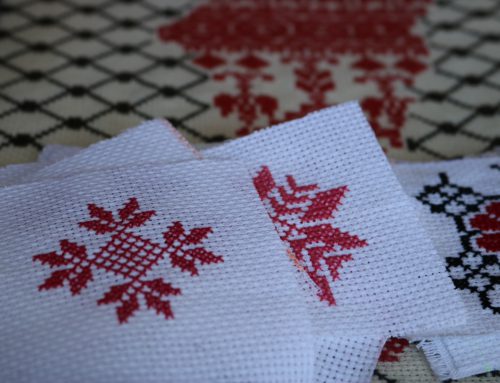BY Sun Noor & Maria Bouabdo
Yasmine Fahmy is a 24-year old music fan from Montreal who is growing their vinyl collection.
“I started to collect vinyl around 2016 because I really enjoy having a physical music library. I also like collecting records of all genres from world music to hip hop,” they say.
Fahmy currently has sixty-six records in their collection.
“Since I wasn’t going to concerts as much over the past two years, I had more money to spend on vinyl, so that’s what I’ve been doing,” they say. “I also needed a new way to get that boost of serotonin I got from live music.”
Raymond Trudel is the co-owner of Montreal’s Atom Heart record store, an alternative music shop that has been around since 1999. He saw a spike in sales in recent years.
“People have always bought vinyl but we saw a lot more sales in 2020, maybe because people had more time to spare,” Trudel says. “We saw that our customers were buying a lot more records and that their taste of music really changed. We’ve been selling a lot more jazz records.”
The pandemic saw vinyl sales in Canada higher than any time since the 1980’s. 1.1 million albums were sold in 2021, beating 2019’s recent high of 1.03 million according to MRC Data reports.
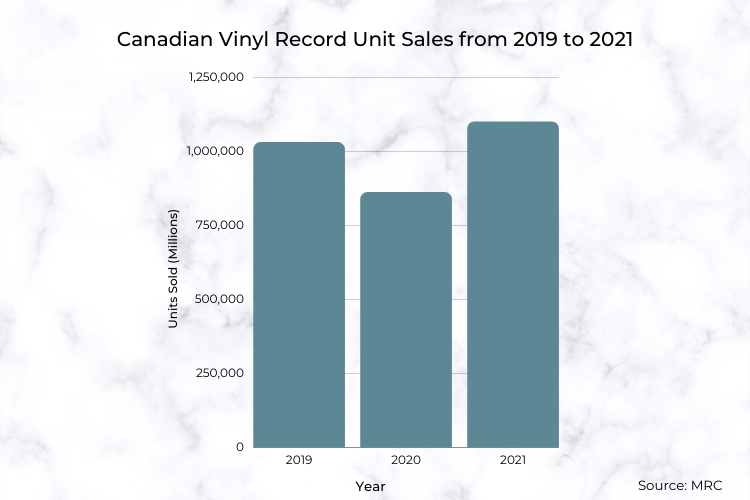
Data visualization chart of vinyl sales from the last three years.
Although Montreal-based labels such as Constellation never stopped pressing vinyl, various other independent labels saw a revival of interest in the early 2010s. Around the same time, streaming platforms such as Spotify became increasingly popular and CDs were making up about half of music sales.

Streaming platforms such as Apple Music remain the most popular way to consume music. Photo by Sundus Noor.
This resurgence of vinyl has run into supply chain problems and massive delays for delivery times over the past two years.
“There are albums that have been out for a few months now and still don’t have dates for vinyl releases. All of these labels want their albums pressed at the same time and that’s causing delays,” says Trudel. “I feel like there are not enough pressing plants to manage all of these orders, which is adding to the delay. Some records got pushed back five times before they were available to order.”
With Montreal’s last pressing plant RIP-V closing its doors in 2014, others jumped in to meet the demand. Le Vinylist opened its doors in 2019, run by brothers Pierre-Luc and Dominic Savard.
“We started the process in the beginning of 2018. Since we knew vinyl would make an even stronger comeback after studying the market,” says Pierre-Luc Savard.
The plant uses an automatic press which enables them to produce large quantities efficiently from independent artists and North-American labels.
“An automatic press can produce over 1000 records in an eight hour period. We have the capacity to produce a lot of records and usually press around 20,000 per month,” says Savard. “The younger generation is really into vinyl because that’s something they didn’t really grow up with.”
As well, LPs offer fans to have the artwork and additional media. “I enjoy looking at some of the booklets that come with LPs and reading linear notes,” Fahmy says.
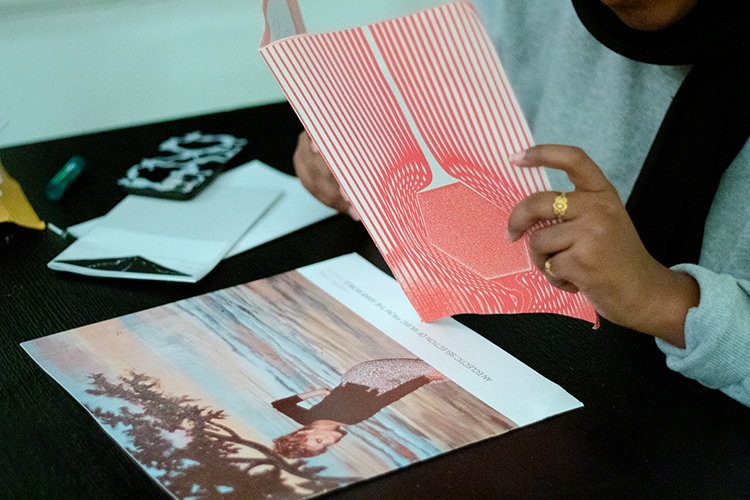
Limited edition booklets that come with records are often sought out by vinyl fans. Photo by Sundus Noor.
But the recent success of vinyl has created problems of its own. Pressing plants across the globe fell behind on orders as they struggled to keep up with demand.
“COVID added a factor of stress. The demand slowly started increasing around May 2020, causing the plant to face longer delays,” he explains. “We had experienced two month delays, now we have about seven to eight months worth of wait times for vinyl.”
Part of the problem is the release of backlog pressings of classic records and large quantities for new releases. Adele pressing 500,000 units of her latest record 30 sparked lots of discourse since that caused longer wait times to press thousands of independent records.
“Just because of (Adele) tons of releases were delayed,” says Trudel. “She was pressing vinyl everywhere to be able to have the album available for release day. Even 10,000 copies is a lot depending on what kind of artist you are. I heard that (Adele) album did really well but we didn’t order any copies.”
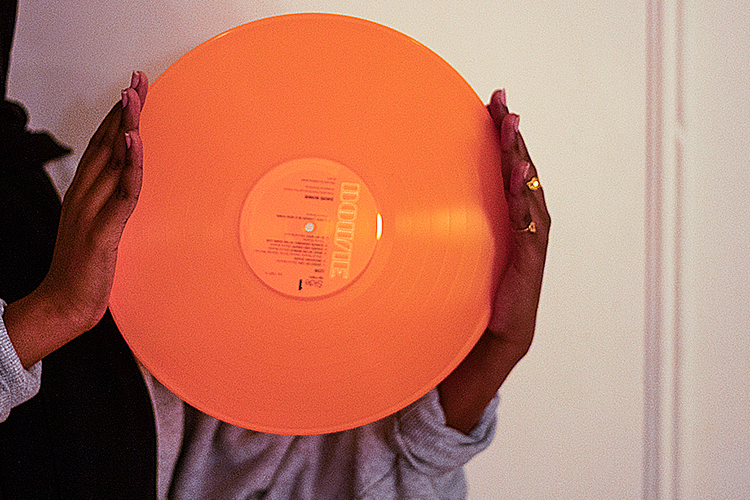
A limited edition orange pressing of David Bowie’s Low for its 50th anniversary. Photo by Sundus Noor.
The global shortage is also tied to issues with the supply chain.
“A fire broke out at Apollo Masters Corporation in February of 2020, the main factory that produces the lacquer discs needed to assemble master plates for pressing records,” says Savard. “This caused a global shortage in the industry, as Apollo was responsible for 80% of the lacquers worldwide.”
Japanese manufacturer MDC managed to take the lead in producing lacquers, taking a few months to meet the demand.
Music has become more easily available digitally, but there is a newfound interest in vinyls. Video by Maria Bouabdo.
Montreal-based rapper Backxwash released her new album, I Lie Here Buried with My Rings and My Dresses in June 2021. She launched a campaign for vinyl releases but only received the copies nine months later.
Fahmy was one of the fans who waited for that record to ship and received their copy in March.
“I’ve been streaming that album a lot so I obviously wanted to get it on vinyl, I was excited to finally receive it even though I had to wait,” they say.
The pandemic saw various artists being vocal about how streaming platforms such as Spotify only pay out a fraction of a cent. Initiatives such as monthly Bandcamp Fridays, where artists are given the full cut of their sales influenced fans to purchase vinyl and merchandise.
“I do still use Spotify but also like to purchase the records I like since that supports artists,” Fahmy says.
Manufacturers are still dealing with a shortage of raw materials.
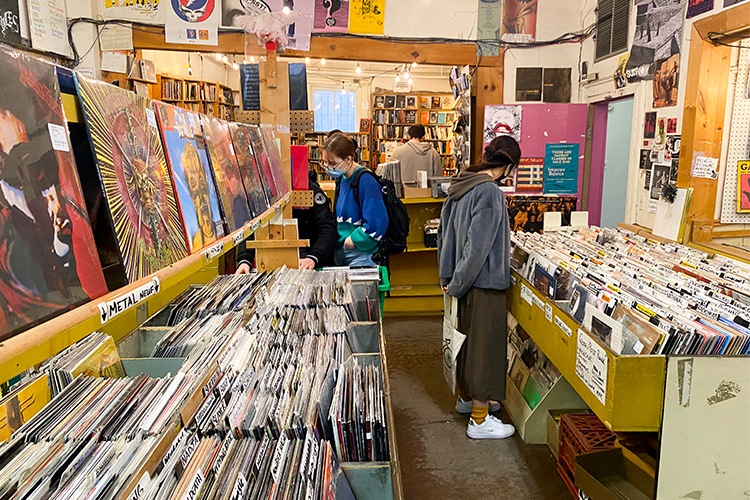
People browsing records at Atom Heart record store in Montreal. Photo by Sundus Noor.
“In 2022 our biggest issue is the shortage of polyvinyl chloride plastics. We’re capable of getting some but things are more regulated due to its shortage, so we can’t get access to as much as we want now. The demand for plastic is really high right now,” says Savard.
Trudel saw vinyl sales increasing over the past two years despite delays.
“Vinyl delays are still happening and it’s terrible but I think that will get better. We managed to get a lot of the releases from this year like the new Cate Le Bon album on time,” he says.
That does not seem to bother vinyl enthusiasts like Fahmy.
“If I like an album, I’m obviously going to get it on vinyl because it makes for a better listening experience. I’m okay with waiting so long as I get the album eventually.”
